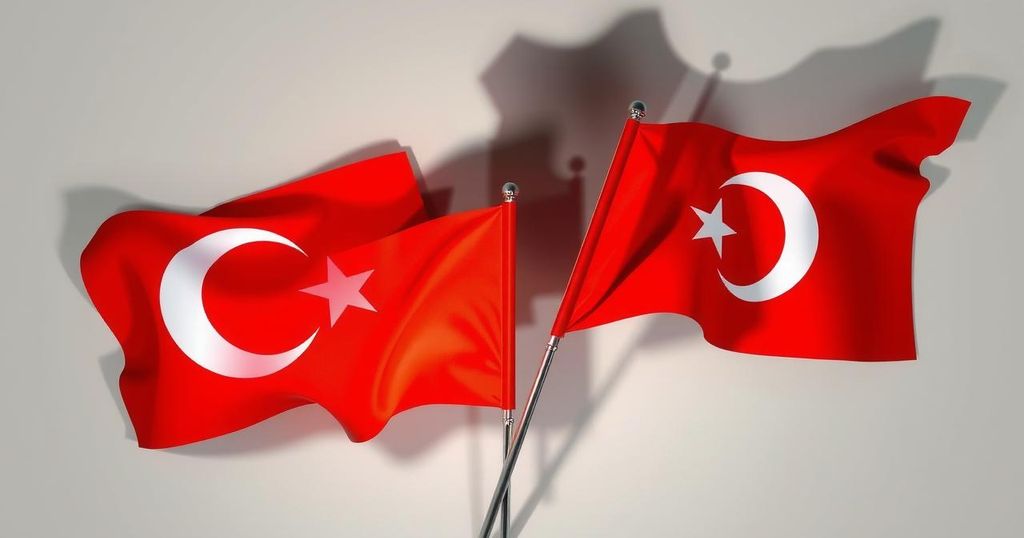Turkey Navigates Complex Strategy in Syria Amid Geopolitical Challenges
Turkey is reassessing its Syria strategy amid military stalemate, Russian opposition, and U.S. sanctions. The government is exploring dialogue with Damascus and new approaches to the PKK, while grappling with regional tensions involving Israel and Iran. As Turkey seeks to balance its security concerns and foreign relations, the outcome of these negotiations remains uncertain, yet pivotal for its future security landscape in the region.
Turkey is at a pivotal moment regarding its strategy in Syria, grappling with military stalemates, Russian opposition, and American economic pressures. As Ankara navigates a complex array of strategies—ranging from engaging with the Syrian government to curbing the influence of the Kurdish-led Syrian Democratic Forces (SDF)—it appears to be reconsidering its Kurdish policy, particularly in relation to the Kurdistan Workers’ Party (PKK). The changing dynamics necessitate a balanced approach to finding a resolution that accommodates Turkey’s security concerns and geopolitical aspirations.
Since 2015, Turkey’s military focus has been to secure its borders from the YPG, an entity aligned with the PKK, which it views as a terrorist threat. Despite previous military operations aimed at dismantling YPG control, Turkey’s strategy has faced significant hurdles due to the fortification of Russian troops in the region and the unwavering support of the United States for the SDF. The U.S. continuously opposes Turkish military incursions and has threatened economic sanctions, adding further strain to Turkey’s already weakened economy.
In recent months, Turkey’s leadership has expressed a desire to engage in dialogue with Syrian President Bashar al-Assad, an indication of a tactical shift in its approach. High-level meetings involving Turkish and Russian officials have sought to facilitate a dialogue with Syria; however, tangible progress remains elusive. Despite this, Turkey’s hope is to forge a cooperative framework aimed at countering the Kurdish threat in Syria while gaining leverage against the SDF.
The potential for Turkey to embrace a new strategy regarding its Kurdish issue arose following remarks by Devlet Bahceli, leader of the Nationalist Movement Party, suggesting that Abdullah Ocalan could address the Turkish parliament if he called for the PKK to end its armed struggle. This unprecedented proposition signals a potential pivot in Turkey’s approach to the Kurdish conflict and its implications for regional security dynamics. Ocalan’s expressed willingness to transition the Kurdish issue from armed conflict to a political framework could provide a pathway forward, though his influence over the PKK remains uncertain.
Turkey’s geopolitical concerns extend beyond the Kurdish issue, as heightened tensions involving Israel and Iran intensify the regional complexity. Turkey is wary of the emergence of a potential U.S.-backed Kurdish state, which would pose a direct threat to its national security. Furthermore, the risk of a humanitarian crisis precipitated by an escalation of conflict in Lebanon could result in a wave of refugees heading towards Turkey, already hosting millions from Syria.
In conclusion, Turkey is navigating a treacherous geopolitical landscape in Syria, marked by conflicting interests and escalating tensions. The potential for a new strategy concerning the Kurdish question signifies a rare opportunity for dialogue and resolution, albeit fraught with challenges. U.S. involvement in this process must be handled with caution to avoid adverse repercussions on Turkish-American relations. The path ahead remains uncertain, yet the necessity for a comprehensive and multi-faceted approach is clear as Turkey seeks to assert its interests amid the complexities of the Syrian conflict.
Turkey’s strategy in Syria is significantly shaped by its historical ties with armed Kurdish groups, particularly the PKK, which it deems a terrorist organization. The PKK has conducted armed struggles within Turkey for decades, complicating Turkey’s military and political considerations within the context of the Syrian civil war. Since 2015, Turkey’s military efforts have increasingly focused on countering the YPG, the Kurdish forces in Syria, which are closely linked to the PKK. In parallel, Turkish relations with both Russia and the United States play crucial roles in shaping its operational capabilities and strategic outcomes in the region.
Turkey’s evolving strategy in Syria showcases its attempts to reconcile internal security concerns with external pressures from Russia and the United States. The prospect of dialogue with the Syrian government and a reevaluation of its Kurdish policies are indicative of a strategic recalibration aimed at addressing the multifaceted challenges it faces. However, the uncertain outcome of these processes necessitates cautious approaches to avoid exacerbating regional tensions while striving for a viable resolution that safeguards Turkey’s interests.
Original Source: www.atlanticcouncil.org




Post Comment